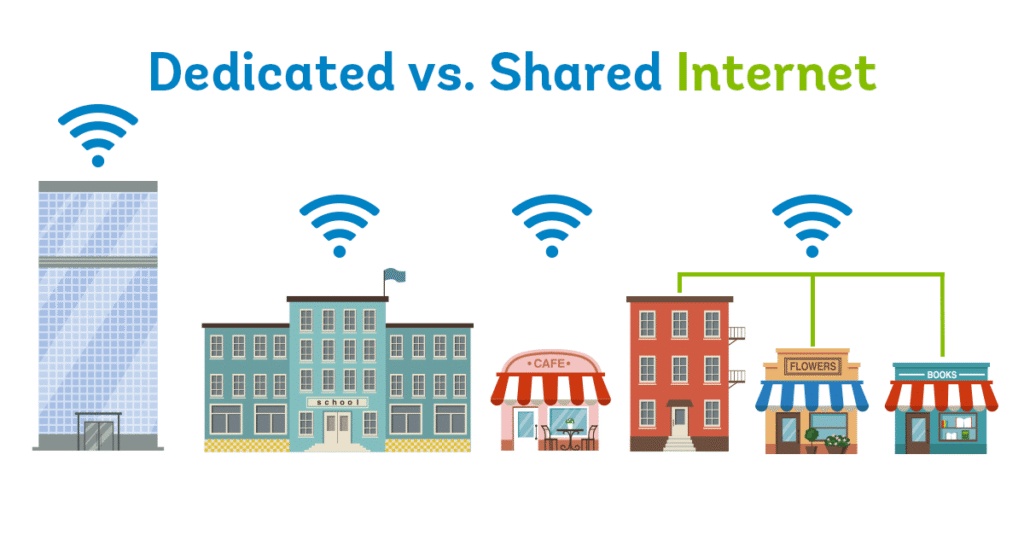In today’s workplace, the internet is no longer just a utility – it’s the spine of how work gets done. Team chats, calls to customers, business routines driven by cloud apps – all depend on it. And that’s why the connection you choose matters.
Two terms that often arise in this context are Direct Internet Access (DIA) and Dedicated Internet Access (also DIA, but more often called a dedicated internet connection). At first, they feel pretty similar. But once you take a closer look, you realise those little differences actually change everything.
Understanding Direct Internet Access (DIA)
Direct Internet Access is basically a dedicated pipe to the public internet. Unlike broadband connections that share bandwidth with other users in your area, DIA ensures that your business gets a direct, uncontended link. This means no matter how many households or shops in your neighbourhood are streaming, your connection isn’t affected.
For businesses that run cloud-based applications, video conferencing, or customer platforms, that consistency can be a huge benefit. It reduces lag, facilitates easier uploads, and provides your IT team with more stability.
Advantages of Direct Internet Access
- Guaranteed bandwidth with reduced volatility.
- Consistent cloud performance for applications such as CRMs and video conferencing.
- Enhanced customer experience through smoother online services.
Disadvantages of Direct Internet Access
- More expensive than regular broadband.
- Needs more planning and assistance during installation.
What is Dedicated Internet Access
Here’s where things get a little confusing. “Dedicated internet access” is used interchangeably with “Direct Internet Access.” Both describe a service where your business has exclusive use of a fixed amount of bandwidth. However, some providers highlight Dedicated Internet Access specifically to distinguish it from shared business broadband.
A dedicated connection is the same speed for uploading and downloading. If you have 200 Mbps, you may utilize that speed in both directions. This is great for companies that transfer big files, do video conferencing, or have remote servers. It is like having your own lane on the road – you are not slowed down by other vehicles.
Advantages of Dedicated Internet Access
- Reliable, symmetrical speeds for both uploads and downloads.
- Supported by service-level agreements (SLAs) for uptime and support.
- Scalable to address increasing business demands.
Disadvantages of Dedicated Internet Access
- More expensive than business broadband.
- Feels like over-investment for smaller teams with simple internet requirements.
The Role of Leased Line Internet Access
Up till now we have looked at Direct and Dedicated Internet Access but there is one more related point: how is this exclusivity and stability actually provided to your business?
The answer is leased line internet access. It is essentially the technology that underpins Dedicated Internet Access. With a leased line, a service provider gives your company a fixed, private circuit that connects directly to the internet backbone. No sharing. No peak-hour slowdowns.
This makes leased lines particularly desirable for businesses that cannot afford downtime – banks, hospitals, or even smaller companies with 24/7 operations. While it’s more expensive than broadband, the reliability typically pays for itself in productivity gains.
Advantages of Leased Line Internet Access
- No sharing of bandwidth with other users.
- Strong performance in mission-critical operations like banking or healthcare.
- 24/7 enterprise-level support.
Disadvantages of Leased Line Internet Access
- Highest starting and monthly charges compared to other options.
- Longer installation time.
Why Businesses are Choosing a Dedicated Internet Connection
During business operations, a quality internet connection is quite crucial. Here are a few reasons why most firms would opt for a dedicated internet connection over regular broadband:
1. Consistency for teams: Nothing halts workflow like poor video calls or slow file uploads. A dedicated connection keeps performance stable during the peak work hours.
2. Support for cloud adoption: If your business is moving to cloud applications – like CRMs, ERPs, or virtual desktops, assured connectivity is non-negotiable.
3. Future readiness: As businesses adopt more data-heavy tools like AI-driven analytics or hybrid workplace setups, a leased line internet access solution ensures you won’t be left scrambling for bandwidth.
4. Professional support: Most dedicated services have high-quality support, which means problems are fixed quickly than with regular internet.
Final Thoughts
Dedicated Internet Access and Direct Internet Access are often used interchangeably, but for a business, the real choice is between shared broadband and a dedicated internet connection. Although shared broadband may be adequate for small operations, but companies that value stability, customer satisfaction, and long-term development benefit much more from dedicated solutions.
With Spectra business-class solutions, from Dedicated Internet Access to leased lines, companies can move beyond the limitations of consumer broadband. The result? Reliable connectivity, happier teams, and the confidence that your operations won’t be derailed by your network.






